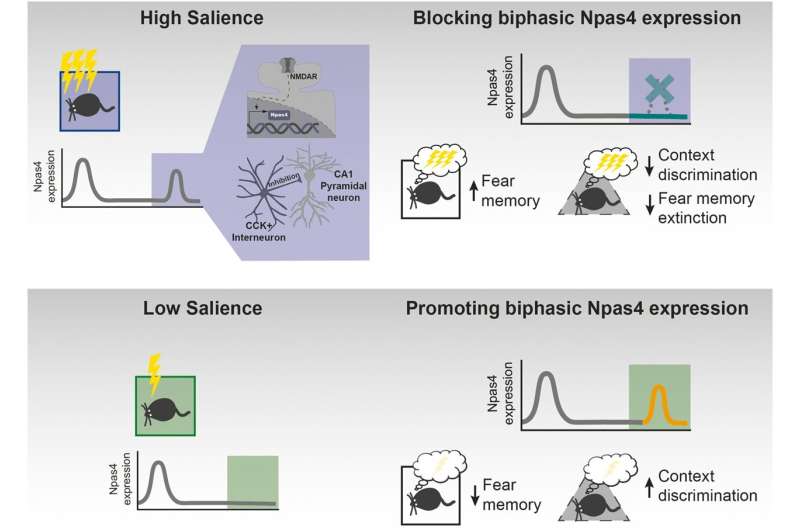This article has been reviewed according to Science X's editorial process and policies. Editors have highlighted the following attributes while ensuring the content's credibility:
fact-checked
peer-reviewed publication
proofread
Protective mechanism discovered in the formation of fear memories could be starting point for new therapies

Researchers at the Central Institute of Mental Health and Heidelberg University have identified a biological mechanism that regulates the strength of the memory of an aversive event. The results of their study offer new starting points for the development of therapies for psychiatric disorders.
Fear memories are crucial for the survival of an organism. They trigger appropriate reactions that enable adaptation to the environment. However, traumatic experiences can trigger strong fear memories, which can lead to mental illnesses such as post-traumatic stress disorder (PTSD).
Researchers at the Central Institute of Mental Health (CIMH) and Heidelberg University have now discovered a biological mechanism that could play a role in regulating resilience to adverse life events. The study is published in the journal Molecular Psychiatry.
PTSD is characterized among other features by disproportionate fear reactions to situations unrelated to the original traumatic event. Therapies to treat these conditions include exposure therapy based on extinction of fear memories, but are often unsuccessful. The research group of Dr. Ana M. M. Oliveira, Head of the Department of Molecular and Cellular Cognition Research at the CIMH, investigated biological processes that can prevent the formation of strong fear memories.
The scientists found that the formation of strong fear memories involves a unique molecular process that is not present in the consolidation of weak fear memories. In experiments with mice, they discovered that experiencing an aversive event leads to two phases of high concentration of the protein Npas4 in the mouse brain.
In contrast, a mildly aversive event only triggered one phase. Interestingly, the authors also found that the second phase appears to function as an interruption that prevents very strong fear memories from being formed. These results suggest that the brain is equipped with a mechanism that fine-tunes the strength of the memory of an aversive event—a new finding.
Specifically, the neuroscientists were able to show that blocking the second phase of Npas4 levels led to a stronger fear memory that was resistant to fear memory extinction and was more likely to trigger disproportionate fear responses. Conversely, the strength of fear memory decreased when the second phase of Npas4 levels was artificially induced. In addition, the mice showed lower fear responses to situations that were unrelated to the original traumatic experience.
The protein Npas4 plays a crucial role in communication between neurons. In their study, the researchers show that the biphasic increase in Npas4 protein levels in the brain after a traumatic event leads to a higher presence of the neurotransmitter GABA, which is responsible for dampening neuronal activity. The scientists suspect that this regulation of neuronal activity is the process by which Npas4 controls fear memory.
"In future studies, it will be important to understand why and how this intrinsic protective mechanism is sometimes bypassed and pathological memories still emerge," says Dr. Ana M. M. Oliveira. "Overall, our study reveals a molecular target that can be harnessed for the development of novel therapies for psychiatric disorders."
More information: David V. C. Brito et al, Biphasic Npas4 expression promotes inhibitory plasticity and suppression of fear memory consolidation in mice, Molecular Psychiatry (2024). DOI: 10.1038/s41380-024-02454-3



















